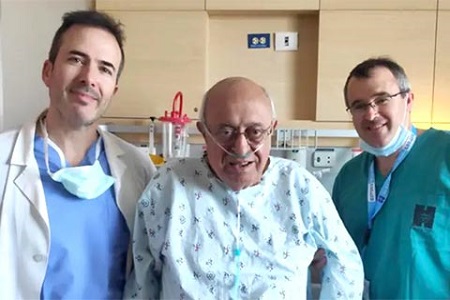
When 74-year-old David Avital tripped and fell at home, he didn’t realize his spine was badly injured. But when he was brought to Hadassah Hospital Ein Kerem, he was diagnosed with fractures in his vertebrae. Hadassah’s orthopedic specialists said he’d have to undergo surgery if he ever wanted to stand on his own two feet again. The septuagenarian, however, had severe heart and lung problems that would make traditional surgery under general anesthesia risky.
Because of the danger, Hadassah’s surgeons decided to perform a less invasive procedure while Avital was fully awake, using only local anesthesia. Hadassah is the only hospital in Israel that offers this surgical option.
Dr. Josh E. Schroeder, head of the surgical team for back deformities, explains, “In older adults, a spine fracture is a common result of a household fall, and it often causes instability or uncontrollable pain. These patients must have surgery to recover. On the other hand, we know that the risks of general anesthesia increase in adults with co-morbidities, as in Avital’s case. In addition, recovery and rehabilitation are much more difficult following surgeries in which the patient has general anesthesia. We worried that Avital would not be able to recover from that kind of surgery.”
Dr. Schroeder performs the less invasive surgeries in collaboration with Prof. Jose Cohen, director of Hadassah’s Brain Catheterization Unit. “These complex surgeries to fix spine fractures,” he relates, “include the insertion of screws and rods using advanced imaging navigation, which provides maximum accuracy with minimal incisions. In this way, we are able to reduce the risks of general anesthesia, the time it takes to perform the surgery and the recovery period.”
Avital recalls, “When I entered the operating room, I was very scared. I was very scared of surgeries in general, and, when the doctors explained to me that I would be awake throughout the operation, I was even more stressed out. It seemed impossible to undergo major spine surgery while awake, but everyone on the surgical team was encouraging. The surgery went by fast, and I didn’t feel any pain at all. It was amazing—to be awake during my own surgery!”
Avital adds, “I am very grateful to the doctors and the other wonderful staff who treated me, at the age of 74. Since I retired from a career in the army, I have been busy volunteering to help others. I was sure that recovery from such an operation would be very difficult for me due to my age, and I was happy to have this special operation from which recovery is faster. I am looking forward to returning to my volunteer activities as soon as possible.”
Prof. Cohen comments, “This case demonstrates a modern approach to surgery. We take major operations and turn them into surgeries with minimal incisions. In this way, six hours of surgery becomes an hour, general anesthesia becomes local anesthesia and a recovery time of two weeks is shortened to two days. The risk of infection is significantly reduced. And, thanks to a multidisciplinary team and the advanced equipment that our endovascular neurosurgery unit received through the generosity of USAID’s Office of American Schools and Hospitals Abroad (USAID/ASHA), we at Hadassah are able to provide the most advanced medical treatment in the world.”
Read about the first such surgery that Dr. Schroeder performed at Hadassah on a young woman earlier this year.
